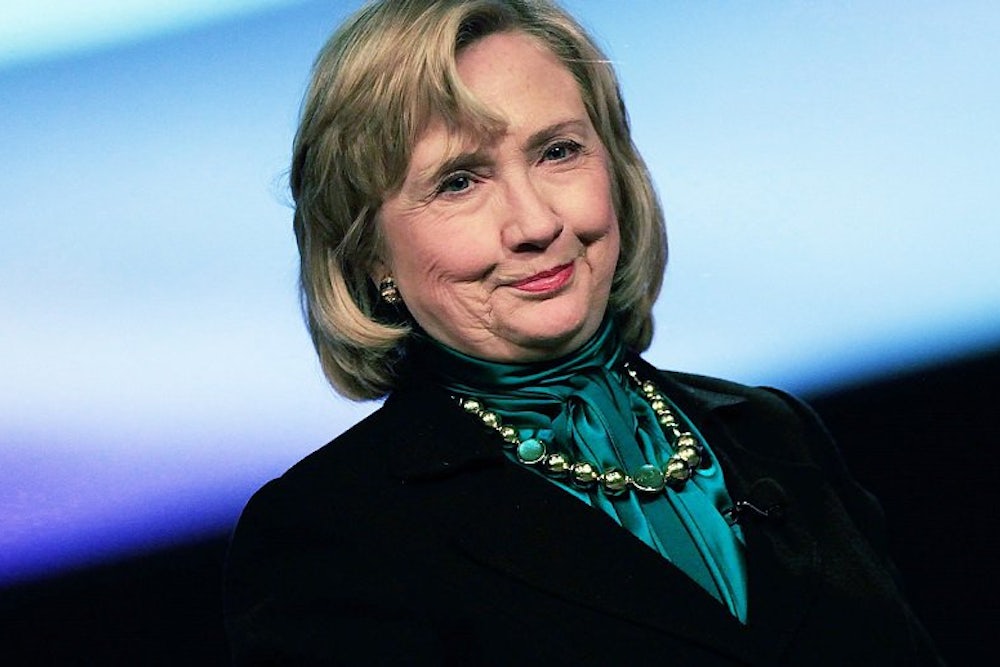After the Democrats were roundly defeated in the midterms, pundits blamed it partly on the left’s stale economic agenda and argued that this agenda will hurt the party in 2016. The latest example of this argument comes from Ed Luce, who writes in the Financial Times that Hillary Clinton’s road to the White House will be damaged by the stale agenda, a disconnect between Clinton and liberal voters, and a more unified conservative base. “As it stands, whatever coalition is expected to carry Mrs Clinton over the finishing line is likely to result from a calculated process of addition,” Luce writes. “In politics, winning is ultimately about ideas. In the absence of new ones, Mrs Clinton’s bridge to the White House looks rickety.” Those are all legitimate concerns. But Luce overlooks a fundamental reason why she is the early favorite: The economy is quickly improving under a Democratic president.
The economy isn’t in great shape right now. Wages are still stagnant. But there are a number of signs that it may improve significantly during Obama’s last two years in office. Monthly job gains have surpassed 200,000 for the past nine months. The Commerce Department’s estimate for third-quarter GDP growth was nearly 4 percent. Workers are quitting their jobs at the fastest rate in more than six years—an indication they have confidence in the economy. New research from the New York Fed indicates that Americans may be done deleveraging, or reducing their debt. Gas prices are also collapsing, leaving more money for consumers to spend on other goods.
Economic forecasters are expecting those green shoots to lead to stronger growth over the next two years. The Congressional Budget Office projects that the economy will grow nearly 4 percent in both 2015 and 2016. The Federal Reserve’s most recent forecast put growth a bit lower, at 2.6-3.0 percent over the next two years. For comparison, growth hovered around 2 percent in 2013 and 2012.
That’s all good news for Clinton, since political science research demonstrates the outsized role that the economy plays in presidential elections: an improving economy benefits incumbents. That's partly why Obama defeated Mitt Romney.
There is less evidence on how the economy affects presidential elections without an incumbent, but we know that it still matters. “If the incumbent president isn’t running, the effect of the economy would be a little bit smaller, but it’s still important,” George Washington political scientist John Sides told me earlier this year. “The logic there being that a new candidate for the party would not get as much credit or blame as the actual president who was presiding over the economy.” In other words, an improving economy benefits the candidate of the incumbent party: The more the economy improves over the next 24 months, the better Clinton’s chances are of winning the presidency.
None of this is to say that the Democrats don’t currently have a problem politically with their economic agenda. They do—and there aren’t any clear solutions to it. But an improving economy will also minimize those political consequences. If growth is between 3 and 4 percent and wages are growing—a big “if” that heavily depends on actions at the Federal Reserve—voters may look more favorably on the Obamanomics. Clinton could seize on popular policies that Republicans blocked during Obama’s time in office—minimum wage increases and equal pay legislation, for instance—and add a few of her own ideas, maybe paid family leave. Thanks to an improving economy, she could make that stale agenda look much more appealing to voters.
The opposite is true as well: If the economy falters, Democrats and Clinton will receive the brunt of the blame and her chances of winning the presidency will fall. A lot can change over the next two years, but the economic data we currently have is indicative of stronger growth over the next two years. That’s a more important indicator for Clinton than any message voters sent Democrats this past November.
